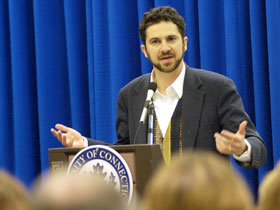Entertainment Eclipses Political News
For Under-40's, Says Speaker
 |
| Author David Mindich gives a presentation on why people under 40 are not interested in the news. His talk was part of a day-long conference on media literacy, held in the Bishop Center on April 15. |
|
Photo by Melissa Arbo |
W hen David Mindich was teaching a class about media law and ethics four years ago, he asked the students how many U.S. Supreme Court justices they could name. More than three-quarters of the class of 23 couldn’t name even one.
Mindich, a journalism professor at St. Michael’s College in Vermont, then asked the class to identify John Ashcroft. Only one student knew that at the time he was the U.S. Attorney General.
That was a shocking revelation, said Mindich, author of Tuned Out: Why Americans Under 40 Don’t Follow the News. He spoke during an all-day conference promoting media literacy on April 15, sponsored by the Neag School of Education.
Mindich, chair of the journalism and mass communication department at St. Michael’s College, is a former assignment editor for CNN. He maintains that America’s youth have tuned out political news, and they need to be tuned back in.
Americans spend about three hours a day – an eighth of their lives – watching television, he noted. “If you live to be 80, that’s a decade of your time in front of the television.” But for young people, most of that time is spent watching entertainment shows, not the news.
The median viewer age of TV network news is 60, he said: “That’s mind-blowing. If you don’t believe it, watch the advertisements: Metamucil, Depends, Fixodent.” Eighteen percent of 18-to-22 year olds say the Internet is their major news source.
Newspaper reading isn’t faring well either.
In 1972, half of college-age Americans read the newspaper every day, he said. Today it’s down to one-fifth. “The media habit is something you either get in your mid-20’s, or you don’t get it at all.”
That can be problematic, he said. “When you don’t know the issues, you can vote against your self-interest.” After traveling around the country talking to different groups and conducting phone interviews, Mindich found that most of the people he spoke with were getting little political news. “It’s very frightening,” he said.
One of the culprits is entertainment, he said. In his research, Mindich found that 57 percent of Americans could name the Three Stooges, but only 17 percent could name three or more Supreme Court justices. “Ninety-six percent knew Alicia Keyes was a singer, but only seven percent could name all three countries President Bush labels as the “Axis of Evil.”
A “thoughtful group of college students” at Brandeis told Mindich why they chose sitcoms and reality shows over news. “They said they were more entertaining,” he said. “Peter Jennings was not as interesting as the characters on Friends or Fear Factor. Entertainment culture is very effective. It gets to the heart of the stories that people are telling each other. News can’t compete with entertainment.”
To address the problem, journalists could introduce “more passion into the news,” he said. “They’ve got to be non-partisan, but it’s okay to care.”
He suggested encouraging journalists to offer more road maps. “A student of mine once said that watching the news was like entering a math class halfway through the semester,” he said.
He also said colleges could ask for a civics portion of the SAT that would gauge a student’s knowledge of politics. And educators could lobby the FCC to ask that networks offer more news shows for children. “Children’s programming is dreadful,” he said.
“Being well-informed is about democracy,” Mindich said. “It’s about holding leaders accountable and getting young people to understand that when they don’t follow the news, they cede their political power to their elders.
“We need to find a way to get young people to pay attention to politics,” he added. “I think the stakes are really high, and if you don’t train students to be watchdogs and get into news habits, they never will.”

